Last updated: 14.11.2025
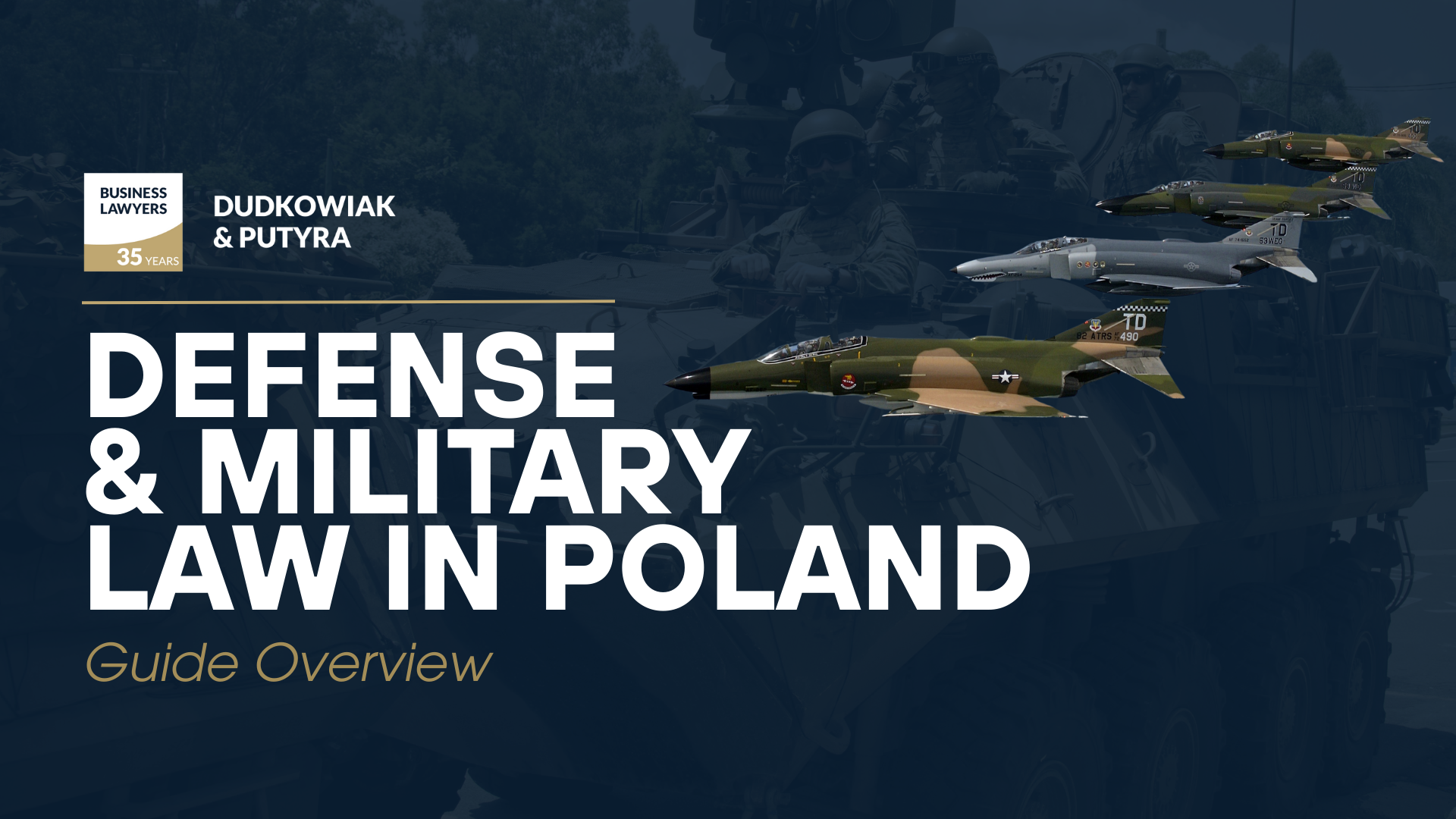
Key facts – defense & military law in Poland
| Area | Key Information |
| Primary legislation | Act on Trading in Goods, Technologies and Services of Strategic Importance (SICA); Act on the Performance of Economic Activity in the Field of Manufacturing and Trading of Explosives, Weapons, Ammunition and Products/Technologies for Military or Police Use (MaDA); Regulation (EU) 2021/821 (Dual‑Use Regulation); Weapons and Ammunition Law; Act on Explosives for Civil Use; Act on Protection of Classified Information. |
| Supervisory authorities | Ministry of the Interior and Administration (MSWiA); Ministry of Development and Technology (MRiT); Ministry of National Defence (MON); Ministry of Foreign Affairs (MFA); National Revenue Administration (Customs & Tax). |
| Scope | Domestic manufacturing and trade (concession regime); export, intra‑EU transfer, brokering, technical assistance, import and transit of strategic goods (licensing regime); defence procurement; protection of classified information; sanctions/embargo compliance. |
| Typical permits | Concession under MaDA for manufacturing, trade, repair and storage of military/police‑use items; Individual/global/national general licences for strategic goods under SICA/Dual‑Use Reg; facility/personnel clearances for classified information. |
| International regimes | EU Dual‑Use framework; EU sanctions and embargoes; UN obligations. Selected projects may need alignment with partner regimes (e.g., ITAR/EAR when cooperating with U.S. entities). |
| Market participants | Arms and ammunition producers; explosives manufacturers; defence technology providers; aerospace/aviation; integrators; logistics; maintenance and repair; private security where applicable. |
Why Defense Law Matters – Intro to Poland’s military legal system
Poland’s defence and security market operates within a clear yet multi‑layered legal framework. Its core objective is to safeguard national security and public order while enabling lawful, traceable trade in sensitive products and technologies.
The framework combines domestic concessions for military/police‑use activities with export‑control licensing for strategic goods and dual‑use items. For new entrants and established suppliers alike, the practical takeaway is simple: success depends on early classification of products and services, correct identification of competent authorities, and disciplined compliance at every stage of the project lifecycle.
What’s Regulated? Scope of military and defense law
The regulatory perimeter in Poland covers distinct but connected areas:
- Domestic activities under the concession regime (MaDA): manufacturing, trade, repair/servicing and storage of explosives, weapons, ammunition and products/technologies intended for military or police use. A single concession decision may authorise one or several of these activities within the precise scope granted.
- Cross‑border activities under strategic‑trade controls (SICA/EU Dual‑Use): export, intra‑EU transfer, brokering, technical assistance, import and transit of strategic goods. The applicable licence type depends on the goods category and the transaction. For dual‑use items, import and intra‑EU transfer generally do not require a permit, with specific exceptions defined by EU law (e.g., Annex IV for certain transfers).
- Defence procurement and participation in tenders: specialised procedures and qualification requirements, including security of supply and information obligations.
- Classified information: organisational and personnel clearances where project execution requires access to classified data.
- Sanctions/embargoes: EU measures and national controls that may affect eligibility of contracting parties, destinations and end‑uses.
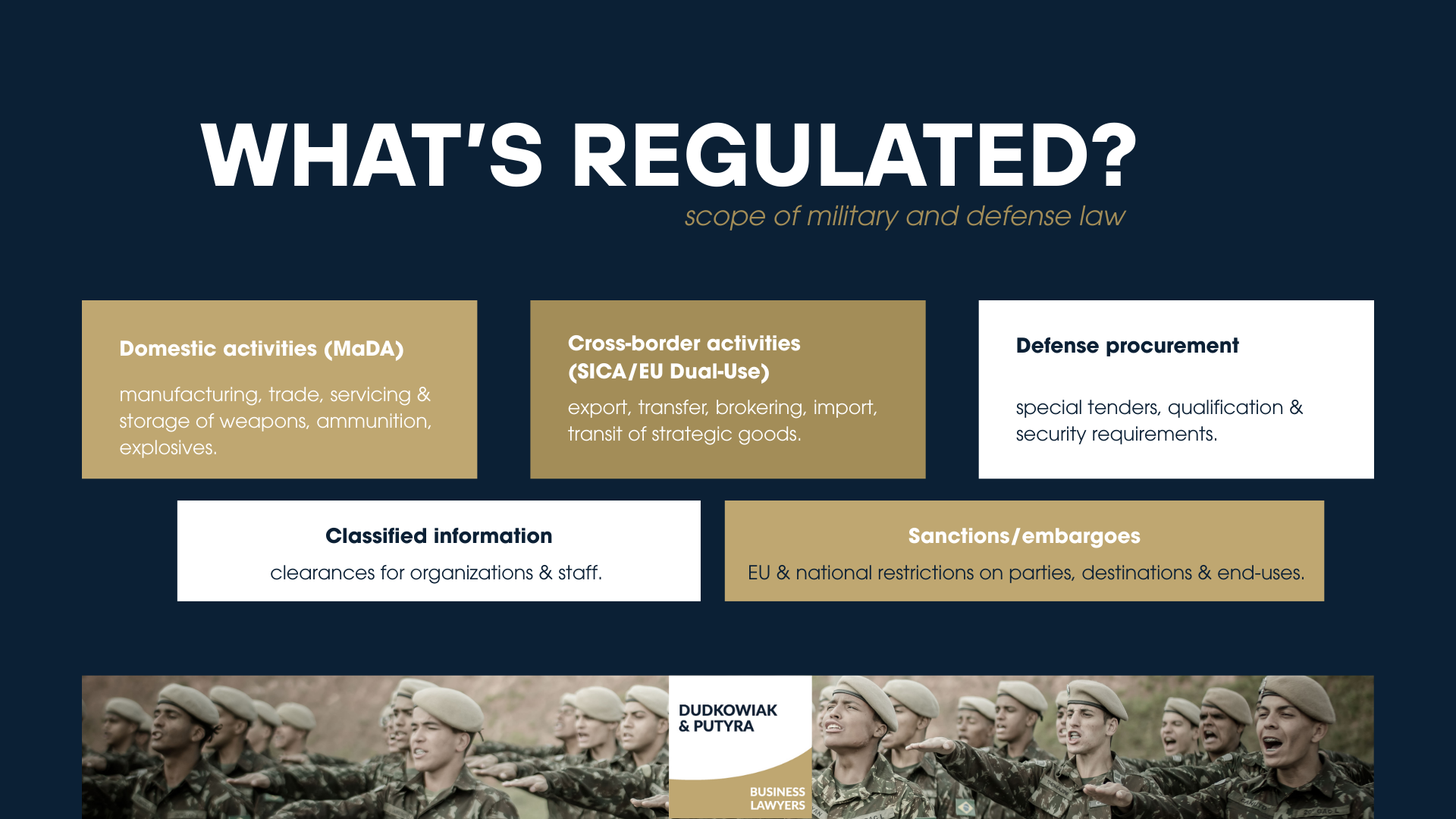
Who’s in Charge? Authorities overseeing military law and permits
Competences are allocated by reference to the nature of the product/activity:
- Ministry of the Interior and Administration (MSWiA): concession authority for domestic activities involving military/police‑use items (manufacturing, trade, repair, storage).
- Ministry of Development and Technology (MRiT): export‑control authority for strategic goods and dual‑use items, including individual, global and national general licences; registration, inspections and related oversight.
- Ministry of National Defence (MON): sector policies, defence procurement and technical standards for military equipment; inputs to licensing where relevant.
- Ministry of Foreign Affairs (MFA): foreign‑policy alignment, treaty obligations and consultation roles in strategic trade; certification for certain import/export documents.
- National Revenue Administration (Customs & Tax): customs enforcement and verification of licences at the border.
Note: There is no single automatic coordination mechanism integrating all approvals. Applicants typically manage parallel procedures and provide the concession authority with proof of meeting site‑specific and safety requirements.
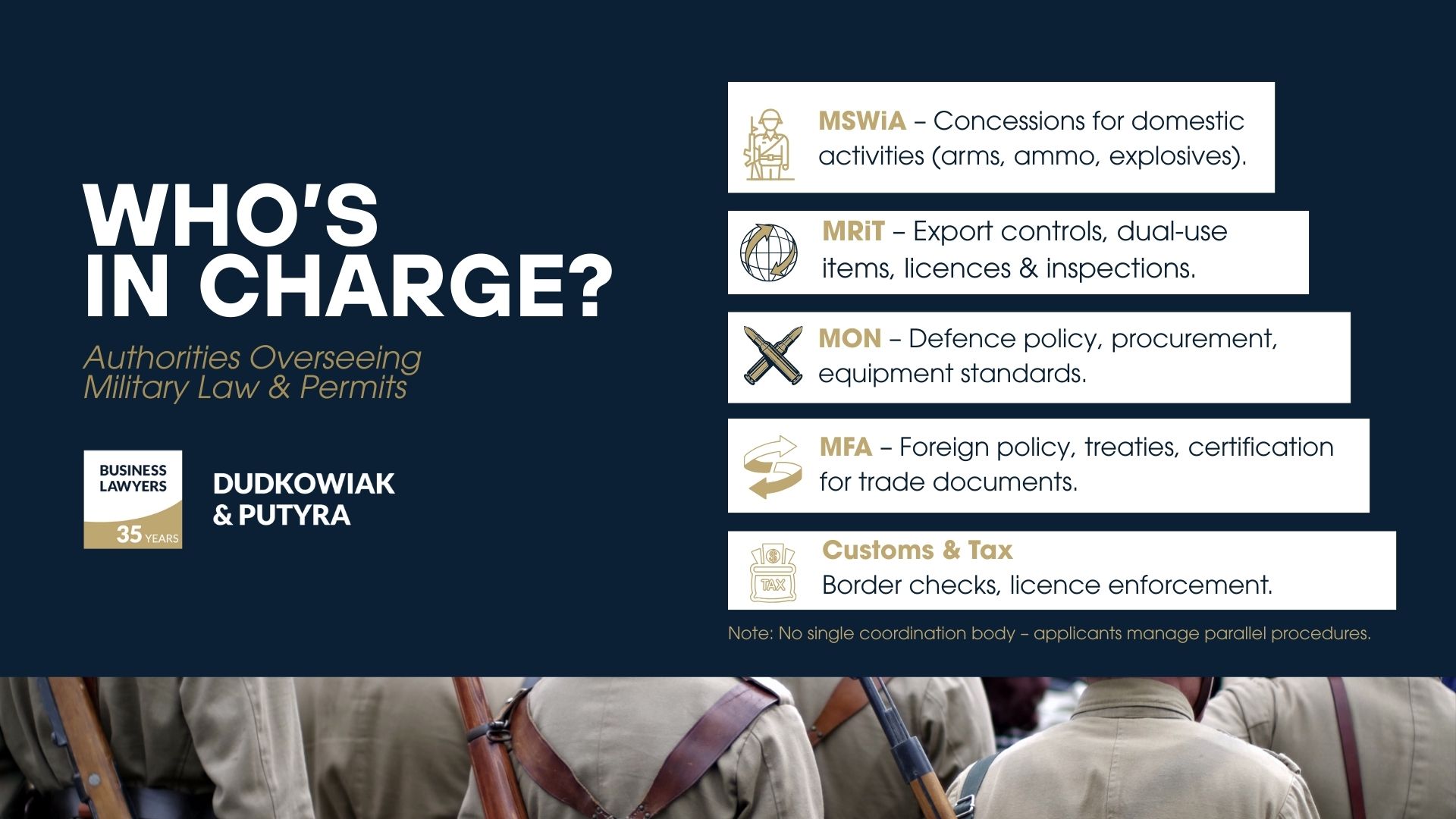
How Licensing Works – Military & defense activity authorisations
If you are wondering whether your business activity in Poland requires a license or concession, start with this short video guide below. It provides a clear overview of the key rules before you move to more detailed legal analysis.
The licensing landscape is structured around two pillars: the MaDA concession for domestic activities and the strategic‑trade licensing under SICA/EU Dual‑Use. Correct classification is the starting point for both.
Concession under MaDA (domestic activities)
- Scope: manufacturing, trade, repair/servicing and storage of military/police‑use items within categories listed in executive ordinances. Each concession precisely defines the authorised scope and locations.
- Selected requirements: corporate documents; proof of professional preparation (including statutory training, where applicable); technical and organisational measures; premises meeting safety, fire and storage standards; internal procedures; security of records.
- Process: application to MSWiA with required attachments; requests for supplementation if documentation is incomplete; consultations/opinions where applicable; on‑site verification; decision specifying scope and conditions.
- Ongoing duties: record‑keeping; reporting; cooperation with inspections; timely applications for amendments when the scope, sites or responsible persons change.
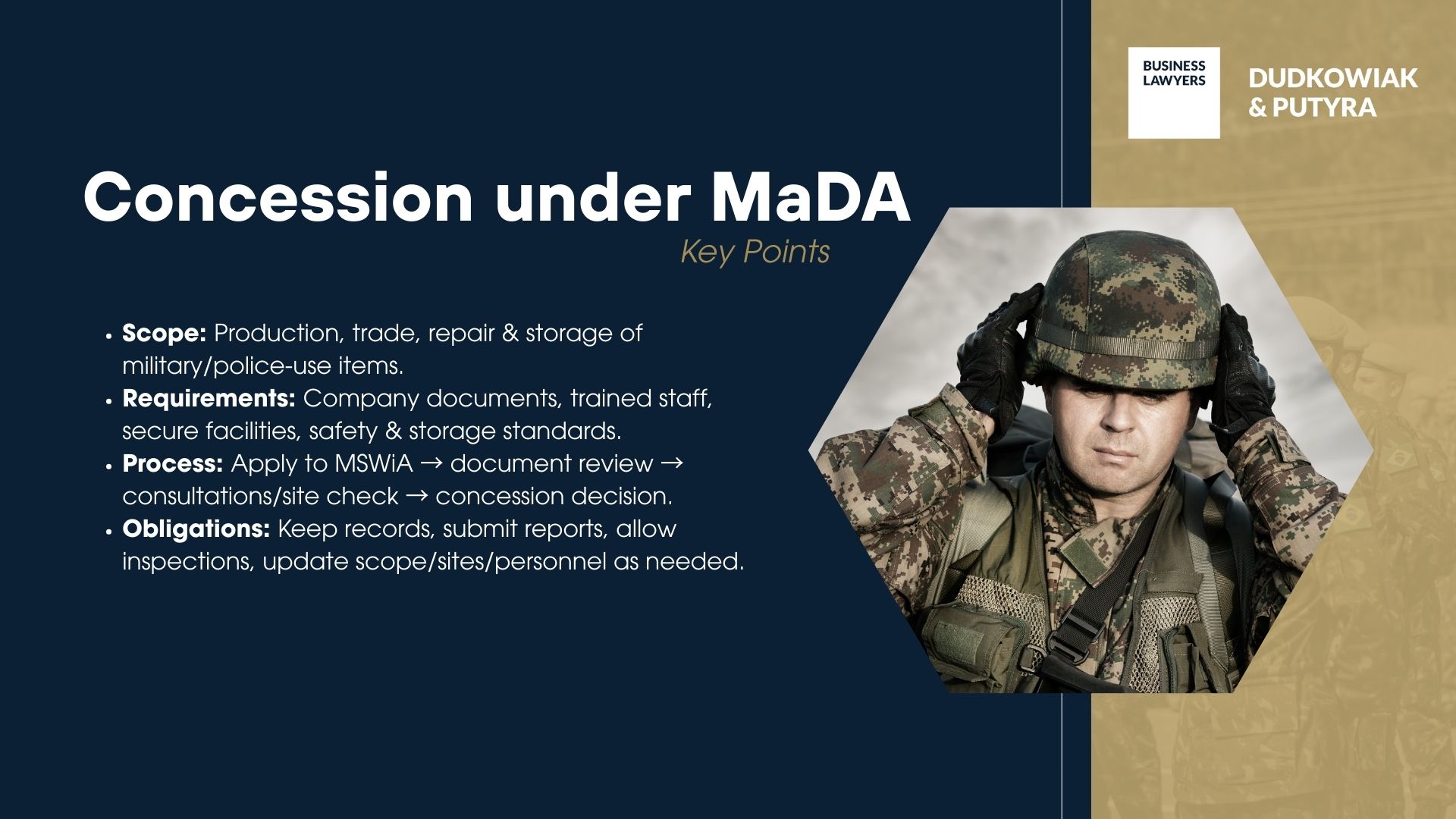
Strategic goods and dual‑use (cross‑border)
- Transactions covered: export, intra‑EU transfer (only for selected Annex IV dual‑use products), brokering, technical assistance (when provided from Poland to a foreign recipient), import and transit.
- Licence forms (examples): individual or global licences; national general licences available for limited, predefined cases subject to registration and compliance conditions.
- Additional documentation: import certificates or end‑user statements may be required by Polish authorities (for export) or issued by Polish authorities upon request of an entity (for import), depending on destination and counterpart.
Practical tip: align concession scope (where applicable) with export‑control classifications early to avoid gaps between domestic and cross‑border permissions.
Table – Authorisations overview
| Type of authorisation | Scope | Competent authority | Typical validity | Notes |
| Concession (MaDA) | Domestic manufacturing, trade, repair, storage of military/police‑use items | MSWiA | Multi‑year (decision‑based) | One decision may cover multiple activity types and sites; precise scope defined in decision |
| Individual export licence (strategic goods/dual‑use) | Specific shipment(s) or project | MRiT | Decision‑based | Tailored to goods/end‑use; may require end‑user documentation |
| Global licence (strategic goods/dual‑use) | Multiple transactions with specified partners/goods | MRiT | Decision‑based | Broader transactional coverage within authorised parameters |
| National general licence | Predefined low‑risk cases | MRiT | As per ordinance | Requires registration and compliance with conditions |
| Classified info clearances | Facility/personnel eligibility to handle classified information | Competent security authorities | As per clearance level | Prerequisite in selected tenders and projects |
Defense Compliance: What Can Go Wrong?
Compliance is document‑intensive and inspection‑driven. Authorities may verify premises, records, training and internal controls. Breaches can lead to fines, revocation of authorisations, confiscation of goods and – where applicable – criminal liability.
Common pitfalls: underestimating timelines for concessions; treating dual‑use exports as standard commercial shipments; incomplete end‑user documentation; insufficient internal controls for storage and record‑keeping.
Recommended baseline: appoint a compliance lead; maintain up‑to‑date product classifications; implement written procedures for licensing, screening and record‑keeping; conduct internal audits prior to inspections.
Smart Moves for Military Sector Success
Poland offers a predictable pathway for compliant defence‑sector operations. With accurate product classification, properly sequenced applications and robust internal controls, businesses can operate lawfully and efficiently.
For detailed guidance on concessions, strategic‑goods trade, explosives and defence procurement, refer to the dedicated subpages and contact our Defence & Military team.
FAQ – Defense and Military Law in Poland
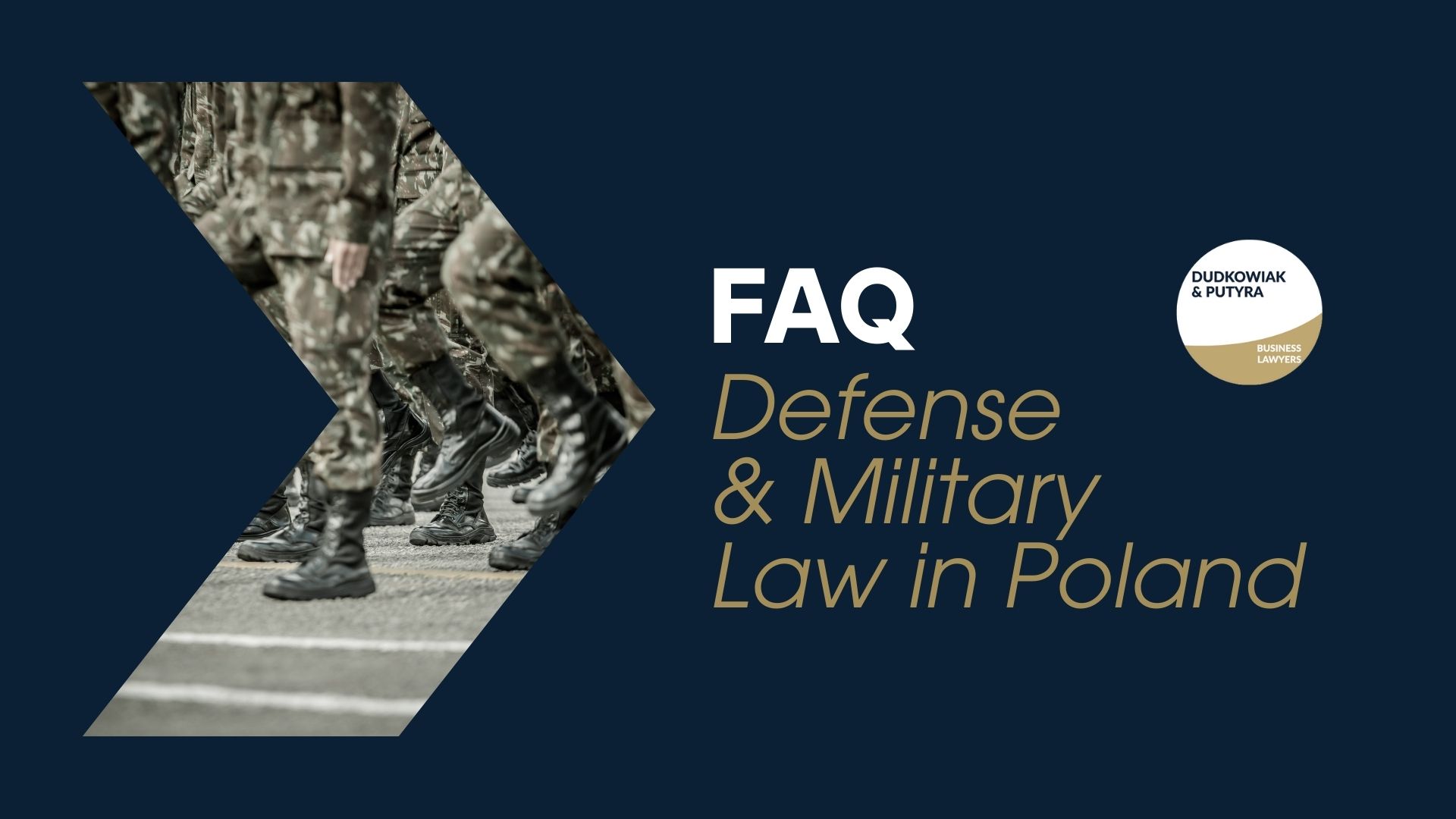
What does military law regulate in Poland?
Military law in Poland regulates activities involving military personnel, armed forces operations, and defense-sector businesses. It covers manufacturing, trading, and storing military-use products, managing classified information, and ensuring military discipline. The framework applies to both military members and civilian contractors in defense projects.
Which authorities oversee military justice and defense trade?
Key oversight lies with:
• MSWiA (military-use concessions),
• MRiT (strategic goods licensing),
• MON (defense procurement),
• MFA (treaty alignment),
• and National Revenue Administration (border control).
Military lawyers and judge advocates may support legal compliance and enforcement.
What permits are needed for military or strategic operations?
A MaDA concession is required for domestic military-use activities. For cross-border operations, individual, global, or national general licenses are issued under SICA and the EU Dual‑Use Regulation. Supporting documents like end-user statements may also be required.
What are common legal risks under Poland’s defense law?
Typical pitfalls include missed concession timelines, misclassified military goods, and poor internal controls. Consequences range from administrative action and civilian penalties to criminal prosecution, especially when breaching licensing or storage rules.
How is classified information protected in military projects?
Access requires facility and personnel security clearances. This is mandatory when working on projects involving classified data, particularly in public tenders or with military officials. Unauthorized access is prohibited and tightly controlled under Polish law.
Can civilian courts hear military cases in Poland?
Yes. While military courts handle service-related offenses, civilian courts – including those with five civilian judges – may rule on military crimes with broader legal impact. Supreme Court and appellate courts may also hear appeals related to military jurisdiction.
How are military justice and criminal law connected in Poland?
In Poland, the military justice system operates alongside criminal law, especially when a military member commits an offense during service. A military judge or commanding officer may initiate a court martial, while serious cases can reach district courts or undergo direct review by a higher authority. Persons serving are subject to strict rules, and any claim, arrest, or use of evidence must align with the uniform code and national laws congress issued.


